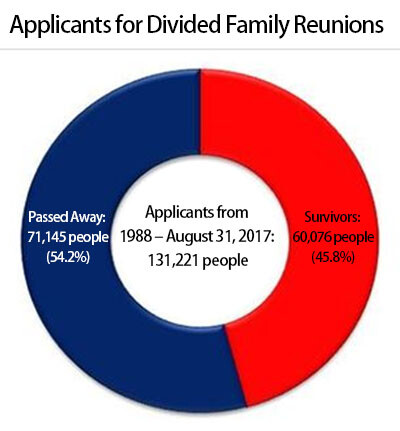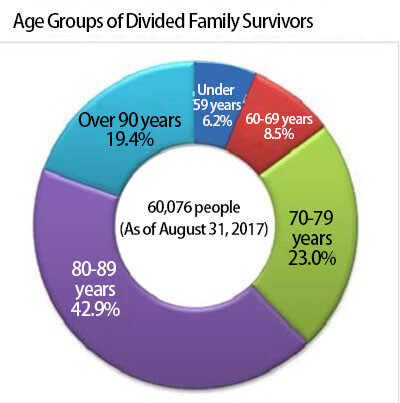hankyoreh
Links to other country sites 다른 나라 사이트 링크
Study calls for “globalizing” the issue of divided family reunions

54% of the 130,000 people who applied for reunions with family members in North Korea have since passed away, while 85% of the surviving 60,000 are aged 70 or older from the first generation of divided families.
A new analysis shows over 7,300 people per year would have to have reunions for all of the survivors to have at least one opportunity in their lifetime to see their family in the North. Amid the chill in inter-Korean relations, some observers are now calling for a solution of “globalizing” the divided family issue by working with the UN and other international institutions to persuade Pyongyang to allow reunions.
A report on divided family reunions published on Sept. 26 by the Hyundai Research Institute found that 71,145 of the 131,221 people who applied for reunions between 1988 and Aug. 2017, or 54.2%, had since passed away – far outnumbering the 60,076 survivors. Among the survivors, 22,633 (37.7%) were aged 79 and under and 37,443 (62.3%) were aged 80 and over. In particular, survivors aged 90 and over – whose window of opportunity to have reunions during their lifetime is fast closing – numbered 11,668, or 19.4%.

Of the 60,000 survivors, 85.3% belong to the first generation of divided family members aged 70 and over. An average of 3,800 divided family members annually passed away between the years 2004 and 2016, with 1,400 of them on average having already had reunions. This means close to 2,400 divided family members per year passing away without ever having the chance to meet their families.
Based on the percentage of survivors and average expected life spans according to Statistics Korea’s 2015 life table, the institute said the minimum number of reunion participants would have to be raised to 7,300 per year for all survivors to have at least one opportunity in their lifetime. With an average anticipated remaining lifespan of 24.7 years for family members in their 50s and 60s, 360 of them a year would have to hold reunions; in the case of those aged 70 and older, the number is 7.4 years, meaning at least 6,930 a year would have to participate.
The first divided family reunions took place in 1985 with 157 people as part of an inter-Korean program of hometown visits and artistic and performance group exchanges. Full-scale events began in the wake of the June 15 Joint Declaration of 2000. Twenty events have been held in the 17 years since, with 23,678 people participating either in government-organized visits to the South or North or video reunions (introduced in 2005).
But strained inter-Korean relations and refusals from the North resulted in the number of participants dropping from 813 in 2014 and 972 in 2015 to just two in 2016 and none in 2017 – a virtual halt in the last two years. Privately organized reunions were first instituted in 1990, with a total of 1,753 events involving 3,412 participants, but the number has been effectively zero since 2005. Combined, government-organized and privately organized reunions have involved 23,342 participants (17,228 visiting the North, 2,700 visiting the South, and 3,414 participating in privately organized reunions), while 3,748 people have participated in video reunions.
In his “Berlin Statement” and Liberation Day celebratory address, President Moon Jae-in urged North Korea to allow divided family reunions and ancestral shrine visits for the Chuseok holiday. To date, there has been no response from Pyongyang.
“Taking into the fact that no divided family reunions have been held in the past two years, we need to now consider ‘globalizing’ the divided family issue,” the Hyundai Research Institute suggested. It’s an approach that would involve cooperating with the UN, the International Red Cross, and other international organizations on ideas for persuading Pyongyang to resolve the issue.
The institute also said reunions should be organized on a regular quarterly or bimonthly basis rather than as one-off events, with special reunions pursued for family members aged 80 and over who have already exceeded the average life expectancy.
By Cho Kye-wan, staff reporter
Please direct questions or comments to [english@hani.co.kr]

Editorial・opinion
![[Column] Season 2 of special prosecutor probe may be coming to Korea soon [Column] Season 2 of special prosecutor probe may be coming to Korea soon](https://flexible.img.hani.co.kr/flexible/normal/500/300/imgdb/original/2024/0426/3317141030699447.jpg) [Column] Season 2 of special prosecutor probe may be coming to Korea soon
[Column] Season 2 of special prosecutor probe may be coming to Korea soon![[Column] Park Geun-hye déjà vu in Yoon Suk-yeol [Column] Park Geun-hye déjà vu in Yoon Suk-yeol](https://flexible.img.hani.co.kr/flexible/normal/500/300/imgdb/original/2024/0424/651713945113788.jpg) [Column] Park Geun-hye déjà vu in Yoon Suk-yeol
[Column] Park Geun-hye déjà vu in Yoon Suk-yeol- [Editorial] New weight of N. Korea’s nuclear threats makes dialogue all the more urgent
- [Guest essay] The real reason Korea’s new right wants to dub Rhee a founding father
- [Column] ‘Choson’: Is it time we start referring to N. Korea in its own terms?
- [Editorial] Japan’s rewriting of history with Korea has gone too far
- [Column] The president’s questionable capacity for dialogue
- [Column] Are chaebol firms just pizza pies for families to divvy up as they please?
- [Column] Has Korea, too, crossed the Rubicon on China?
- [Correspondent’s column] In Japan’s alliance with US, echoes of its past alliances with UK
Most viewed articles
- 1‘We must say no’: Seoul defense chief on Korean, USFK involvement in hypothetical Taiwan crisis
- 2[Editorial] Korea’s surprise Q1 growth requires objective assessment, not blind fanfare
- 3Division commander ordered troops to enter raging flood waters before Marine died, survivor says
- 4[Column] Season 2 of special prosecutor probe may be coming to Korea soon
- 5Is Japan about to snatch control of Line messenger from Korea’s Naver?
- 6S. Korea “monitoring developments” after report of secret Chinese police station in Seoul
- 7No good, very bad game for Korea puts it out of Olympics for first time since 1988
- 8The dream K-drama boyfriend stealing hearts and screens in Japan
- 9[Column] ‘Choson’: Is it time we start referring to N. Korea in its own terms?
- 10Is N. Korea threatening to test nukes in response to possible new US-led sanctions body?